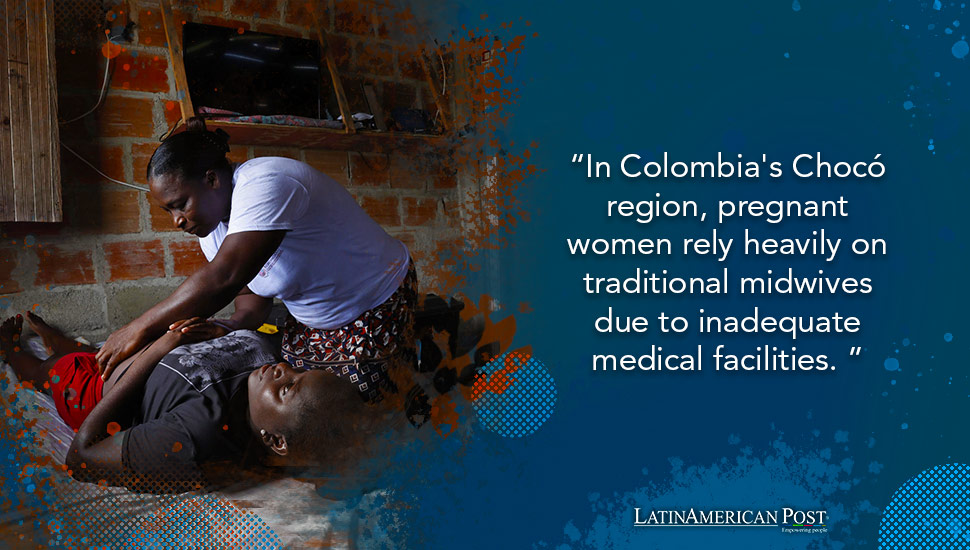Challenges and Hopes in Maternal Care in Colombia’s Chocó Region

In Colombia’s Chocó region, pregnant women rely heavily on traditional midwives due to inadequate medical facilities. This article explores the interplay between traditional and modern medicine and the need for improved healthcare infrastructure.
In the remote municipality of Iró, located in Colombia’s Chocó department, pregnant women face significant challenges in accessing proper healthcare. The journey from their homes to the Santa Rita health center involves just fifty steps, but the conditions at the center often lead them to rely more on traditional midwives, known locally as parteras. Despite their dedication, these midwives work under challenging conditions, highlighting the urgent need for better healthcare infrastructure and support.
Relying on Traditional Midwives
Jennifer Palacio, the head nurse at the Santa Rita health center, reveals that many women prefer to give birth at home with the assistance of parteras like María Crucelina Sánchez, affectionately known as ‘Chilina.’ The health center, lacking essential equipment such as an ultrasound machine and the capability to perform cesarean sections, struggles to provide the necessary care. “In May, we didn’t attend a single birth; they are all handled at home,” Palacio admits.
Chilina’s home has become a sanctuary for pregnant women in the community. Despite the challenges, she uses a Doppler device to detect fetal heartbeats. The absence of proper medical facilities forces women to rely on their expertise, which often involves navigating through dense forests and across rivers to reach healthcare services.
Leidy Quinto, an apprentice midwife, echoes the challenges faced by the community. In areas like Todositico, where there is no health center, a partera is crucial. “If there is no midwife, there is no one to deliver babies,” Quinto explains. The dire situation in these remote areas highlights the government’s neglect, as evidenced by the lack of basic healthcare infrastructure and support.
Government Neglect and Maternal Mortality
The healthcare crisis in Chocó is exacerbated by the lack of medical professionals willing to work in these challenging conditions. Manuela Mosquera, president of the Association of Midwives of Chocó (Asoredipar), describes the reluctance of doctors to enter health centers with bullet-riddled doors. The region is plagued by violence from criminal groups like the Clan del Golfo and guerrilla factions such as the National Liberation Army (ELN), creating an environment of fear and neglect.
This lack of medical care has dire consequences. Chocó’s birth rate is nearly three times the national average, and preventable maternal deaths are significantly higher than in other parts of Colombia. Mosquera points out that midwives are often unfairly blamed for these deaths despite their efforts to work in tandem with medical professionals. “The envy and disrespect towards the culture of the pregnant woman who goes to a midwife is evident,” she asserts.
For midwives like Chilina, modern medicine is not an adversary but an ally. She insists on having an ultrasound report before attending to any pregnant woman. “If the doctor says there is a high risk and something happens, they will blame the midwife,” she explains. This collaboration is crucial, yet the systemic issues of armed violence, intra-family violence, and poverty create significant barriers to achieving comprehensive maternal care.
Integrating Traditional and Modern Medicine
Integrating traditional and modern medicine is essential for improving maternal care in regions like Chocó. Mosquera advocates for a better relationship between medical professionals and midwives. “If doctors and nurses listened to the midwives who bring pregnant women to them, there would be a perfect bond because midwives are in the territories wanting to minimize maternal deaths,” she argues.
The Constitutional Court of Colombia has mandated the government to integrate midwives into the healthcare system and compensate them for their invaluable work, especially during the pandemic. However, midwives like Manuela emphasize that more than recognition is needed; they need respect and acceptance of their role in the community. “We don’t need acknowledgments; we need respect and acceptance,” she states firmly.
This call for integration and mutual respect is crucial for the sustainable development of healthcare in Chocó. Providing midwives with the necessary training and resources while also ensuring that medical facilities are equipped to handle emergencies can significantly reduce maternal mortality rates. Moreover, fostering a culture of collaboration between traditional and modern healthcare providers can enhance the overall effectiveness of maternal care.
Latin American Context
The challenges faced by midwives in Chocó are not unique to Colombia. Across Latin America, indigenous and rural communities often rely on traditional birth attendants due to the lack of accessible healthcare services. In countries like Mexico, Peru, and Guatemala, midwives play a critical role in maternal health, particularly in remote areas where healthcare infrastructure is inadequate.
These regions share similar challenges, including high rates of maternal mortality, limited access to medical facilities, and cultural barriers to healthcare. In many Latin American countries, the integration of traditional midwifery practices with modern medical care is an ongoing effort. Successful programs often involve training for midwives, government support, and community engagement to ensure that maternal care is culturally sensitive and medically sound.
In this broader context, midwives’ experiences in Chocó reflect Latin America’s larger struggle for equitable healthcare. Addressing these issues requires a comprehensive approach that includes policy changes, investment in healthcare infrastructure, and recognition of the valuable role that traditional healthcare providers play in their communities.
The journey of pregnant women in Chocó, from the guidance of midwives like Chilina to the inadequate facilities at the Santa Rita health center, underscores the urgent need for improved healthcare infrastructure and support. Colombia can create a more inclusive and effective maternal care system by fostering collaboration between traditional and modern healthcare providers.
Also read: Colombia’s Health System Faces Critical Challenges and Inconsistencies
The lessons from Chocó highlight the importance of integrating cultural practices into healthcare, ensuring that investments in healthcare infrastructure are responsive to the community’s needs, and recognizing the critical role of midwives in improving maternal health outcomes. As Latin America continues to address these challenges, the stories of midwives and the communities they serve provide valuable insights into building a more equitable and effective healthcare system for all.





